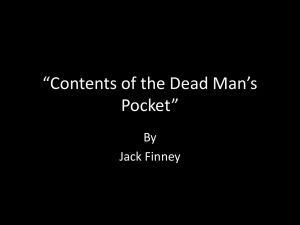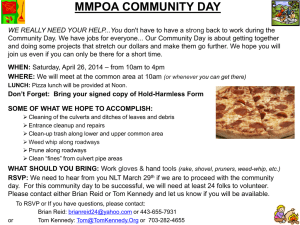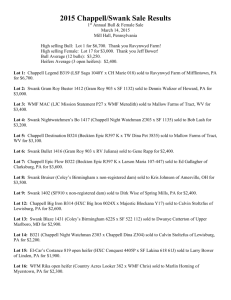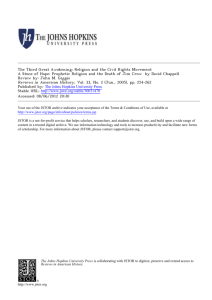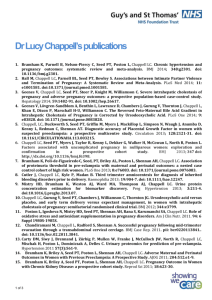Tom's of Maine: Spirituality & Workplace Diversity
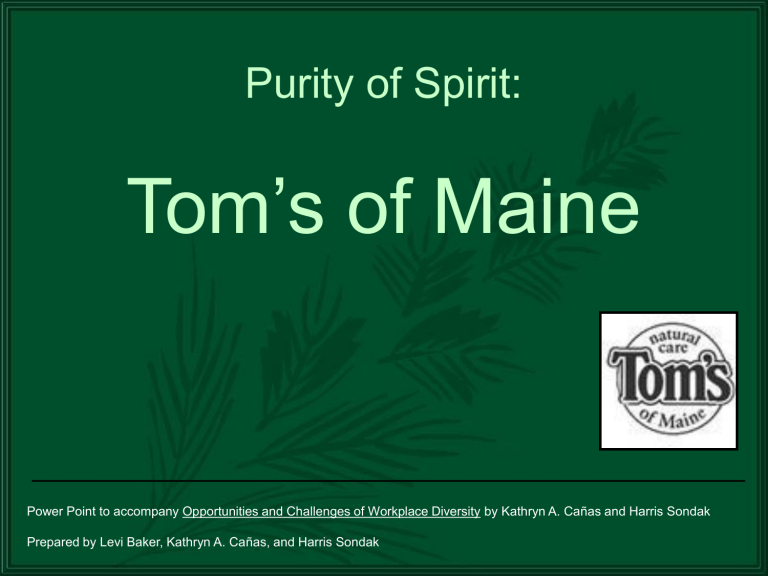
Purity of Spirit:
Tom’s of Maine
__________________________________________________
Power Point to accompany Opportunities and Challenges of Workplace Diversity by Kathryn A. Ca ñas and Harris Sondak
Prepared by Levi Baker, Kathryn A. Ca ñas, and Harris Sondak
“Tom’s of Maine is a living, breathing—and profiting—proof that a business enterprise can be good for the earth, good for society, good for its employees, and good for its shareholders.” – Tom Chappell
Case Overview
• Introduction
• History
• Spirituality-Inspired Business Philosophy
• Spirituality-Inspired Business In Action
• Value-Centered Leadership
• The Seven Intentions
• Organizational Design and Diversity
• Empowering Employees and the Community
• Respecting the Individual and the Environment
• Spirituality in the Workplace
• Discussion Questions
Introduction
• Tom’s of Maine was founded by Tom and Kate Chappell in
1970.
• All products are made from natural ingredients.
• Company sales are strongest on the East and West coasts.
• The flagship product is toothpaste (60% of revenues).
Additional Products: floss, deodorant, mouthwash, soap, shampoo, shaving cream, and other wellness products.
History
• 1970 Introduced world’s first non-phosphate laundry detergent
• 1973 Expanded products to all-natural soap, shampoo, and lotion
• 1975 Added all-natural toothpaste
• 1981 Increased sales to 1.5 million
History
• 1981 Hired more professional talent including several young employees with MBA degrees
• 1983 Increased sales to 2 million
• 1988 Decreased founder Tom Chappell’s time to
3 days a week; Chappell later returned to full time and created the company’s mission and values
• 1994 Struggled with the “deodorant debacle”
• 1996 Considered selling the company but decided that potential buyers did not fit with company ideals
• 1999 Introduced a new line of wellness products
• 2006 Sold 86% interest in company to Colgate-
Palmolive for $100 million
Spirituality-Inspired Business
Philosophy
Philosophies that influenced Tom’s of Maine’s culture
• I-It vs. I-Thou
– I-It philosophy sees others as objects to use for selfish purposes. I-Thou sees relationships as honorable and seeks friendship, respect, and love.
• Jonathan Edward, American Philosopher
– An individual’s identity comes not from being separate from others but connected to others.
Spirituality-Inspired Business
In Action
Examples
1. The refusal to receive the seal of approval from the American Dental Association (ADA) in 1990 and the lobbying effort with the FDA a year later due to both organizations’ policies toward testing on animals.
2. The commitment to the Kennebunk community herb extraction.
Value-Centered Leadership
Managing Upside Down: The Seven Intentions of Values-Centered Leadership
1. Society and ethics over maximizing financial gain
2. Increased profitability through people
3. Flat organizational hierarchy
4. The seven intentions
The Seven Intentions
1. Connect
2. Know Thyself, Be Thyself
3. Envision Your Destiny
4. Seek Advice
5. Venture Out
6. Assess
7. Pass It On www.saltwater.org
Organizational Design and Diversity
“It was not long before I realized that the more sensitive my executives and I could become to the differences of the people we were trying to serve, and the more perspectives we could plug into our discussions about product design, business strategy, and customer service, the more broadly the company could range to meet its financial objectives.”
-Tom Chappell
• Circle: the team, all are equal
• Triangle: the management, accountability, and decision-making
Empowering Employees and the
Community
“Live the mission.”
• 10% of all pre-tax profits go to charitable organizations.
• Employees are encouraged to dedicate 5% of their paid work time to volunteer.
• Tom’s of Maine often organizes company-wide volunteer projects.
• Tom’s of Maine offers generous benefits packages to their employees.
An Apple a Day
Rivers Awareness
Dental Health For All
Company Volunteerism
Respecting the Individual and the
Environment
• Giving Programs
• Environmental Policies
• Consumer Policies
Spirituality in the Workplace
Respectful Pluralism reflects an organization that is not “aligned with any explicitly religious, spiritual, or other comprehensive worldview” and where
“organizations should allow for significant employee expression of various aspects of their identity on an equal basis.”
-- Dr. Douglas A. Hicks
Discussion Questions
• How should management accommodate a variety of conflicting spiritual perspectives in the workplace?
• Tom Chappell created a spiritual framework for Tom’s of
Maine, a family-owned business. Can such a framework be created for a publicly-traded company? What differences might there be in its effects?
• To what extent is Tom Chappell’s spiritual perspective responsible for the company’s organizational culture and the company’s successes and/or failures?
• What risks might a company encounter when encouraging the expression of spiritual values in the workplace? What advantages does it gain?

